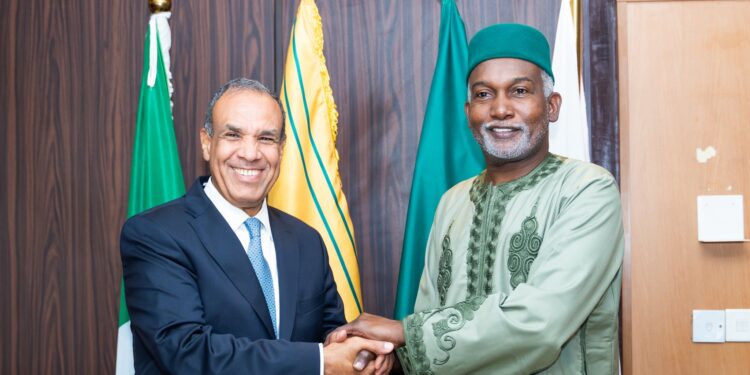Nigeria and Egypt are strengthening their economic partnership as over 30 top executives from Egypt’s largest companies visit Nigeria to explore diverse investment opportunities. The high-level delegation, led by Egypt’s Minister of Foreign Affairs, Immigration, and Expatriates, Badr Abdel Aaty, marks a renewed push to enhance bilateral trade and economic collaboration between the two African powerhouses.
During his meeting with Nigerian Foreign Minister, Ambassador Yusuf Tuggar, in Abuja, Aaty underscored the strategic intent of the visit, describing Nigeria as a vital gateway to the African continent and a crucial partner for Egypt. The visiting delegation includes CEOs from Egypt’s leading companies across various sectors, such as agriculture, pharmaceuticals, energy, industry, oil and gas, and mining. Many of these companies have already achieved significant transformations at home, including converting desert land into productive farmland.
Aaty emphasized that the purpose of the visit is to tap into Nigeria’s enormous market potential and create win-win partnerships, pointing to the country’s conducive investment environment and abundant natural and human resources. He stressed that both countries must urgently raise the volume of trade and investment, which remains far below expectations given their size and economic influence in Africa.
According to Aaty, “We have more than 30 giant Egyptian companies from multiple sectors here in Nigeria because we see the opportunities. The current trade volume between our countries does not reflect the true potential of our relationship. We are committed to doubling and even tripling it in the near future.”
Ambassador Tuggar echoed similar sentiments, calling for accelerated cooperation to meet the D-8 Organization for Economic Cooperation’s goal of increasing intra-D-8 trade to $500 billion by 2030. The D-8 group, which includes Bangladesh, Egypt, Indonesia, Iran, Malaysia, Nigeria, Pakistan, and Türkiye, represents a powerful economic bloc with shared goals of industrial development and South-South collaboration.
Tuggar also revealed plans for the establishment of a Nigeria-Egypt Joint Commission, which will subsume existing trade arrangements such as the Chamber of Commerce, in order to streamline and fast-track economic initiatives. This joint mechanism is expected to support bilateral investments and institutional partnerships in various sectors, including infrastructure, solid minerals, renewable energy, agriculture, water management, ICT, aviation, pharmaceuticals, tourism, manufacturing, and textiles.
While addressing participants at the second edition of the Nigeria-Egypt Business Forum in Abuja, Tuggar noted that the bilateral trade volume between the two countries stood at just $211.2 million in 2023, an imbalance favoring Egypt, whose exports to Nigeria were estimated at $199 million, compared to Nigeria’s $12.2 million in exports to Egypt. He called for urgent action to address the disparity and maximize the potential under the African Continental Free Trade Area (AfCFTA).
With a combined population of over 345 million people representing nearly a quarter of Africa’s total population and an estimated collective GDP exceeding $1 trillion, both countries possess immense market power and complementary strengths. Tuggar described the current moment as a “golden opportunity” for Nigeria and Egypt to lead the continent in intra-African trade integration.
He also announced that the Egyptian delegation would attend the Jigawa State Business Forum, with interest already expressed in replicating Egypt’s agricultural innovations, particularly desert reclamation and expanding participation in Nigeria’s gas, electricity, and minerals sectors.
The meeting concluded with a call for private sector leaders from both countries to move beyond dialogue and establish lasting institutional frameworks that can drive investment, foster innovation, and create shared prosperity.
This renewed Nigeria-Egypt economic engagement is being hailed as a significant step toward transforming the two nations into major players in continental trade and development, with a long-term vision to drive Africa’s economic future through strategic alliances, mutual investments, and regional integration.













Leave a comment